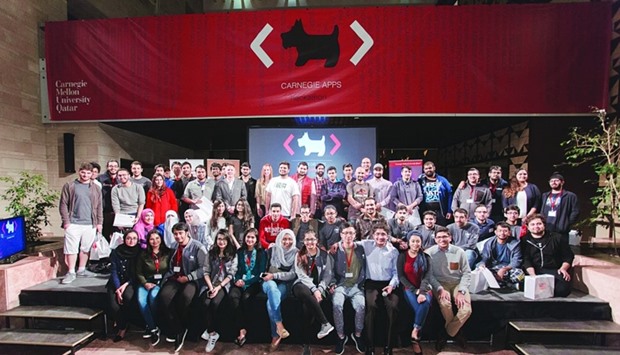A total of 55 students on 15 teams participated in the 24-hour programming competition held on the CMU-Q campus in Education City.
Hackathon 2017 was sponsored by Education Above All (EAA), Qatar Computing Research Institute (QCRI) and Cosette Solutions, who provided judges, mentors and prizes for the event.
Hackathon is an annual event where university students work around the clock to develop software for an innovative game, mobile application or web application using software of their choice.
The event is organised by students with guidance from associate professor of information systems Dan Phelps, who described the CarnegieApps Hackathon "as an opportunity for students to demonstrate everything they have learned to identify, tackle one of the challenges the sponsors are experiencing, and apply their skills to help solve that problem in a real-world context.”
This year, Hackathon featured a new award category in humanitarian technology. Sponsored by EAA’s programme Protect Education in Insecurity and Conflict (PEIC), the category challenged students to develop technology solutions to different humanitarian issues across the globe. PEIC's academic advisory director Maleiha Malik attended the closing ceremony.
Haya Thowfeek, a graduate of CMU-Q information systems who now works as an information management officer at EAA, said:
“EAA is currently working on a project called the Global Data Service that aims to create a central hub of information with data on the number of attacks on education. This will assist in the EAA/PEIC mandate of advocacy in defence of the right to education.”
The winning team in the new category created an algorithm that collects data using web-crawling, databases, and Google and Twitter trends. The algorithm creates a confidence level for each event, visualises it using mapping tools, and creates a predictive model which highlights regions where an attack was possible. This would allow organisations such as EAA to contact agencies near those conflict zones to offer assistance.
QCRI sent two judges to the event: Hassan Sajjad, scientist, and Yasser Makram, senior software developer. Omar Shamiyeh, CEO of Cosette Solutions and a CMU-Q information systems graduate, also judged the event.
The teams at the event represented CMU-Q, College of the North Atlantic – Qatar, Qatar University, and Gulf University of Science and Technology and Kuwait University. This is the first time a university outside of Qatar has sent teams to the event.
The awardees are as follows: Best Humanitarian Technology - Shahan Ali Memon, Syed Mehdi, Ibrahim Soltan and Sharjeel Khan from CMU-Q; Best Overall App - Maher Khan, Mohamed Fituri, Yasser El-Sayed and AbdulRahman Alfayad from CMU-Q; Best Rookie Team - Mohamed Nahin Khan, Kaustubh Ayer, Maimoon Siddiqui and Hanna Farooq Moazam, CMU-Q; Best Design - Ahmad Alfulaij, Osama Aljassar, Hamad Waleed and Abdullah Almunayae from the Gulf University of Science and Technology and Kuwait University; and Best Technical Challenge - Aliaa Essameldin, Sabit Hassan, Aisha Mohamed and Shaden Shaar from CMU-Q.

A total of 55 students on 15 teams participated in the 24-hour programming competition held on the CMU-Q campus in Education City.
Students from across Qatar, as well as eight from Kuwait and one each from India and Australia, came to Carnegie Mellon University in Qatar (CMU-Q) for the annual CarnegieApps Hackathon.
